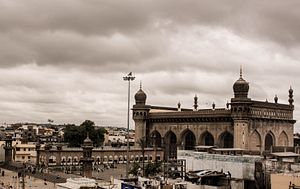Nearly a year ago, Andhra Pradesh, India’s eighth-largest state, split in two. The partition gave birth to a new province, Telegana, and divided India’s 50 million Telugu speakers between two states. Disenfranchised citizens at the head of the statist movement alleged they had been neglected by Andhra’s government and passed over for economic opportunities.
As part of the split, Andhra Pradesh and Telegana will share the current capital, Hyderabad for the next decade, at which point, Telegana will subsume the city. The center of the pearl trade during the British Raj, Hyderabad is now an information technology hub, the site of R&D facilities for companies like Microsoft. It was the fifth largest contributor to India’s GDP last year.
Andhra Pradesh’s chief minister, Chandrababu Naidu, plans to build from the ground up, recently revealing plans for a new capital, dubbed Amaravati, meaning “the town that lives forever” in Telugu. Construction, scheduled to wrap up in 2020, will be costly, a bill that Andhra Pradesh can’t pay on its own.
Facing a budget shortfall of tens of millions of dollars, they have had to turn to foreign investment to build their new capital. Worse yet, Andhra Pradesh has to do that without their primary source of tax revenue, Hyderabad.
Enter China. Naidu jetted off to the Middle Kingdom last month to sign ten non-binding agreements with Chinese technology manufacturers to build factories in and around Amaravati. Naidu has pinned Andhra Pradesh’s hopes to these companies to replace revenues from Hyderabad.
On the last stop of his six-day tour, Naidu openly invited Chinese manufacturers to do business in Andhra Pradesh, stressing that water, land, power, and state government support would be readily available to businesses that invest in the state. The groundwork that Naidu laid in his visit for a could be finalized during Prime Minister Narendra Modi’s visit to China this week.
The campaign to build Amaravati encapsulates how India’s relationship with China is changing. As Delhi and Beijing become increasingly interconnected, Naidu has capitalized, hoping to bring some of that investment back home to Andhra Pradesh. He’s secured an agreement for direct Chinese investment in a solar energy manufacturing plant in the state, fitting with the Chief Minister’s vision of creating a capital that can match Hyderabad’s dynamism in the 21st century.
Naidu, chairman of the Telugu Desam Party, allied with Modi’s Bharatiya Janata Party (BJP), was elected to a second non-consecutive term as Chief Minister of Andhra Pradesh in 2014. Since then, he has aggressively developed plans for the state’s future, starting with the new capital.
As Naidu continues to make plans for Amaravati, the growing presence of China in India’s domestic thinking is increasingly apparent. If Naidu can secure the funding for Andhra Pradesh’s new capital, China may end up footing a large chunk of the bill.
Saagar Enjeti is a policy and data analyst in New York City.

































